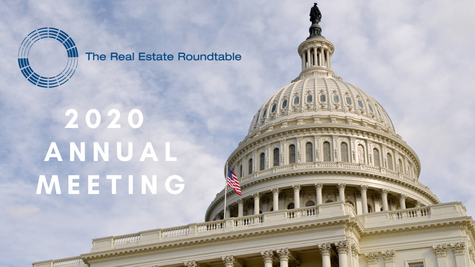
The Real Estate Roundtable’s first Virtual Annual Meeting this week attracted nearly 300 Roundtable members who remotely accessed discussions with Treasury Secretary Steven Mnuchin and industry leaders on COVID-19 policy responses, racial injustice and business reopening challenges. The Roundtable’s policy advisory committee meetings also held their first remote meetings to analyze policy issues in the tax, capital and credit, sustainability and homeland security areas with subject matter experts from Capitol Hill, federal agencies and the private sector.
- Roundtable Chair Debra Cafaro (Chairman and CEO, Ventas, Inc.) launched the business meeting yesterday, noting the June 9 statement on racial injustice she issued with Roundtable President and CEO Jeffrey DeBoer. (See related story below for more details)
- Cafaro noted The Roundtable’s intense focus on the economic repercussions of the coronavirus. She explained how the organization has successfully pivoted its focus to advocating policies that support economic recovery, including a pandemic risk insurance program modeled after TRIA; ongoing efforts to reform the Paycheck Protection Program; Federal Reserve credit lending facilities that accommodate CMBS; and federal efforts that could preserve the “rental obligation chain.”
- Cafaro also announced that four individuals will join The Roundtable’s Board of Directors and three current Directors will depart, effective July 1. The new Board Members are:
- Thomas J. Baltimore, Jr. – Chairman, President & CEO, Park Hotels & Resorts
- Ken McIntyre – Chief Executive Officer, Real Estate Executive Council
- Brandon Shorenstein – Chairman and Chief Executive Officer, Shorenstein Properties
- William Stein – Chief Executive Officer, Digital Realty Trust & Chair, Nareit
- The exiting Board Members, who Cafaro thanked for their accomplished service, are:
- Tom Arnold – Global Head of Real Estate, Abu Dhabi Investment Authority
- Tim Byrne – President and Chief Executive Officer, Lincoln Property Company
- Robert A. Spottswood – President, Spottswood Companies, Inc.
Policy Issues & Featured Speakers
The Roundtable’s June 11 Annual Business Meeting included the following speakers:
- Treasury Secretary Steven Mnuchin discussed the Administration’s work with Congress to address the economic fallout from the outbreak with The Roundtable’s Jeffrey DeBoer. Secretary Mnuchin emphasized how recent improvements to the Paycheck Protection Program (PPP) has helped small business borrowers deal with the economic impact of the global pandemic. He added that the Administration is also considering business liability protections and pandemic risk insurance.
- Citi’s Vice Chairman Raymond McGuire discussed “Real Estate’s Role in Addressing Racial Injustice” with Roundtable Immediate Past Chair William Rudin (Co-Chairman and CEO, Rudin Management Inc.). McGuire noted that fortunate opportunities for an excellent education is what made the difference in his life experience and that providing similar opportunities to African American youths is of vital importance.
- “Reopening the Economy, Returning to the Workplace, Reinforcing Health Protections” panel featured leading industry executives discussing reopening strategies, operational protocols, potential liability concerns and more. The discussion is available to stream at your convenience. Separately, Roundtable Board Member and Sustainability Policy Advisory Committee Chair Tony Malkin (Chairman and CEO, Empire State Realty Trust, Inc.) was interviewed on CNBC this week on safety protocols and other measures that can be utilized for reopening businesses. (CNBC interview, July 9)
- Governor Jared Polis (D-CO) focused on Colorado’s approach to managing the outbreak, as it has recently reopened most businesses while practicing social distancing. In his video interview, “States Set the Pace,” Gov. Polis discusses how state government can work with the real estate industry on practical safety measures to help businesses looking to reopen.
- Dr. Scott Gottlieb, former Food and Drug Administration Commissioner (2017-2019) and Roundtable Chair Debra Cafaro discussed medical aspects of the novel coronavirus and his health policy perspectives on the crisis. Dr. Gottlieb noted, “We still have a slowly expanding epidemic in the United States” that has a high case fatality rate. He added that the world could see multiple vaccines with some targeting specific populations based on age or other factors.
- Charlie Cook, Editor and Publisher of the Cook Political Group, outlined the dynamics of the upcoming election cycle during a health pandemic and economic downturn. Cook emphasized the importance of approximately 5 percent of independent voters who will make a choice in an election without third-party candidates.
Roundtable Policy Committees
The Roundtable’s Policy Advisory Committees and associated task forces also met remotely in conjunction with the Annual Meeting, offering a combination of live and recorded presentations for participants. A video featuring all Roundtable Committee Chairs providing updates on each committee’s policy efforts is available on The Roundtable’s youtube channel.
This week’s committee meetings analyzed policy issues in detail with high-level congressional and agency staff:
- Research and Real Estate Capital Policy Advisory Committee (RECPAC):
Rep. French Hill (R-AR), who serves on the House Financial Services Committee and the Congressional Oversight Commission on the CARES Act, provided insights on recent and future COVID-19 economic relief and stimulus during this joint committee meeting. Additionally, industry experts discussed the state of real estate capital and credit markets, including the Fed’s Term Asset-Backed Securities Loan Facility (TALF). - Tax Policy Advisory Committee (TPAC):
House Ways & Means Chief Tax Counsel Andrew Grossman joined TPAC to share his perspective on committee priorities and the tax legislative outlook. A panel of leading real estate tax authorities also discussed legislative proposals focused on the current distress in U.S. real estate – particularly debt restructurings, impaired rent and cancellation of indebtedness (COD) income. Additional wide-ranging tax policy TPAC discussions are available on demand:- A View from the Chairman— TPAC Chairman Frank Creamer, Jr.
- A Discussion on the Recent Social Unrest, COVID-19, Tax Policy, and Legislative Priorities with a Member of the House Ways and Means Committee – Rep. Brad Schneider (D-IL)
- An Interview on Tax Law and Administration in the Pandemic – Michael J. Desmond, Chief Counsel, Internal Revenue Service
- Tax Policy in the U.S. Senate – Sarah Schaefer, Tax Counsel, Senate Finance Committee
- Sustainability Policy Advisory Committee (SPAC):
U.S. Environmental Protection Agency speakers provided an update on the ENERGY STAR certification program and its Portfolio Manager Benchmarking tool in the Covid-19 Era. EPA and the Centers for Disease Control and Prevention (CDC) speakers discussed “Reopening Guidance for Cleaning and Disinfecting Workplaces.” SPAC members also focused on “Healthy Building Strategies in a Global Pandemic” with the senior executives from the Center for Active Design and the International WELL Building Institute. - Homeland Security Task Force meeting (HSTF) and Risk Management Working Group (RMWG):
The joint meeting attendees heard briefings by government officials on the threat of civil unrest, looting, homegrown violent extremists and organized attacks on commercial properties – and the security, management and health challenges related to building re-entry. The Task Force was also briefed on the need to enact a federal business continuity/pandemic risk program aimed at providing capacity for policyholders in need of insurance protection from the enormous costs associated with pandemics.
Next on The Roundtable’s meeting calendar is the September 22 Fall Meeting, which is restricted to Roundtable-level members only. The Roundtable has also posted its 2021 meeting calendar dates.
# # #






